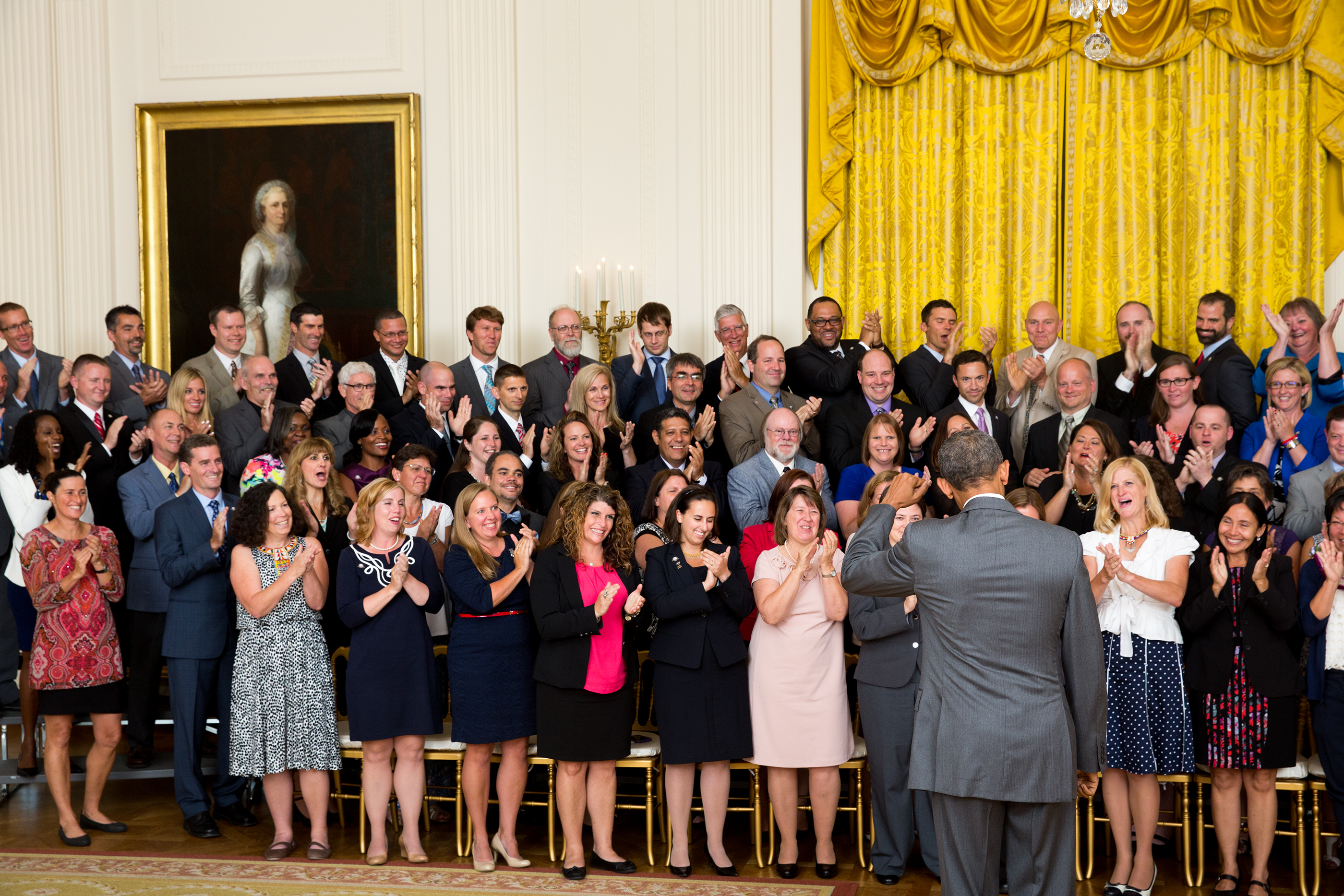Office of Science and Technology Policy Blog
Honoring Outstanding Teachers and Announcing Further Progress in Support of the President’s STEM Education Goals
Posted by on July 31, 2015 at 4:37 PM ESTSchool was in session today at the White House, as President Obama welcomed more than 100 teachers who received the 2013 Presidential Awards for Excellence in Science and Mathematics Teaching (PAEMST).

Investing in exemplary teachers is vital to inspiring the next generation of explorers and innovators. Great teaching is a key part of any child’s success, and in science, technology, engineering, and math (STEM) fields, it is critical to create educational experiences that are project-based, hands-on, and build a love of lifelong learning.
As the President has said, “Strengthening STEM education is vital to preparing our students to compete in the 21st century economy and we need to recruit and train math and science teachers to support our Nation’s students.”
Learn more about EducationThe Measure of Science
Posted by on July 31, 2015 at 11:44 AM ESTMeasurements are everything in science. It's simple – if you can't measure it, you can't study it. Yet scientists and the public often take for granted the measurements that we make every day. Underlying each measurement, whether time or distance or mass, is a standard. Standards are how we ensure that a centimeter in Washington, DC is the same as a centimeter in Des Moines, IA and that a dose of a drug administered at the Cleveland Clinic is the right amount, even if the drug was tested in Boston, MA. The study of measurement is “metrology,” an underappreciated field upon which the modern world rests.
This week, OSTP staff visited the main campus of the National Institute of Standards and Technology (NIST) in Gaithersburg, MD, where scientists spend their lives developing and calibrating the measurement standards that we rely on every day. The work at NIST impacts some of our Nation's biggest priorities, from improving cybersecurity to enabling breakthroughs in advanced manufacturing. NIST's ability to have such impact is tied to its cutting-edge research programs in measurement science. The fundamental importance of NIST’s work for all science was evident in every lab and display cabinet. From the low-tech reference material marked "human liver" and "peanut butter" in the NIST museum to the sophisticated kilogram standard and the atomic clock (housed in a NIST lab in Boulder, CO). By ensuring the accuracy and consistency of standards like these, NIST makes reliable science possible.

Human lung and human liver standard reference material, developed at NIST (All photos credit: Eleanor Celeste).
Learn more aboutAdvancing U.S. Leadership in High-Performance Computing
Posted by on July 29, 2015 at 3:09 PM ESTOver the past 60 years, the United States has been a leader in the development and deployment of cutting-edge computing systems. High-Performance Computing (HPC) systems, through their high levels of computing power and large amounts of storage capacity, have been and remain essential to economic competitiveness, scientific discovery, and national security.
Today, President Obama issued an Executive Order establishing the National Strategic Computing Initiative (NSCI) to ensure the United States continues leading in this field over the coming decades. This coordinated research, development, and deployment strategy will draw on the strengths of departments and agencies to move the Federal government into a position that sharpens, develops, and streamlines a wide range of new 21st century applications. It is designed to advance core technologies to solve difficult computational problems and foster increased use of the new capabilities in the public and private sectors.
Learn more about TechnologyUsing Data to Transform Policing in New Orleans
Posted by on July 22, 2015 at 5:27 PM EST
Fifteen year old Operation Spark student Grace Clark helps New Orleans Police Chief Michael Harrison write his first line of code: nopd.showRecords(1000) (Photo credit: Tyler Gamble/New Orleans Police Department)
The power of data to transform our society for the better is incredible. One of the areas to use data for immediate impact is in policing. Recently, the President’s Task Force on 21st Century Policing provided recommendations on how to best use the power of data to improve policing, including better use of data and technology to build community trust and reduce inappropriate interactions with residents.
On May 21, the President announced the launch of the Police Data Initiative, as a follow-up to this Task Force. Under this program, 24 jurisdictions nationwide have committed to open up datasets about policing, and to participate in a peer-learning network to share data innovations across law enforcement agencies. One of these jurisdictions is the City of New Orleans.
Last week, New Orleans held an event to preview three datasets on policing they plan to open to the general public (use of force, 911 calls for service with arrival times included, and field interview cards). At the event, city officials worked with a group of young coders to build apps powered by this newly unlocked data.
Learn more about , , TechnologyGreen Button Initiative Makes Headway with Electric Industry and Consumers
Posted by on July 22, 2015 at 10:57 AM ESTThe United States has long been an international leader in promoting technology and innovation policy while providing consumers the rights and access to the resources they need to derive economic value and make informed decisions. This administration has worked toward these goals through the liberalization of Federal data, and in 2013, President Obama signed an executive order to commit the government to releasing open, machine-readable data. This has enabled public access to tens of thousands of government datasets, which are directly available for download at data.gov.
In that spirit, the White House, the U.S. Department of Energy, and the National Institute of Standards and Technology launched the Green Button Initiative in 2012, providing American businesses and families with simple and secure access to their energy consumption data in a standardized format, an effort that has since grown significantly in size and sophistication.
Learn more about , TechnologyCelebrating Five Years of the National Ocean Policy
Posted by on July 22, 2015 at 8:50 AM ESTIt’s an exciting summer for the ocean, and we’re not just talking about Shark Week. President Obama proclaimed June 2015 as National Oceans Month, and, in mid-June, Capitol Hill Ocean Week here in Washington, DC, featured a series of displays and symposia highlighting the multifaceted wonders of the ocean and the challenges of conserving and managing ocean resources.
This week marks the anniversary of a significant milestone in the journey to improve ocean governance in the United States: five years ago, on July 19, 2010, President Obama signed an Executive Order creating the first National Ocean Policy and a Federal interagency National Ocean Council (NOC), which we co-chair, to implement it.
To honor this anniversary, we offer some reflections here about the importance of the National Ocean Policy in helping the Nation meet its stewardship responsibilities for the oceans, coasts, and Great Lakes, and the work that the NOC and its partners across the country have done to make this Policy a reality.
Learn more about Energy and Environment
- &lsaquo previous
- 1
- 2
- 3
- 4
- 5
- 6
- 7
- 8
- 9
- …
- next &rsaquo
White House Blogs
- The White House Blog
- Middle Class Task Force
- Council of Economic Advisers
- Council on Environmental Quality
- Council on Women and Girls
- Office of Intergovernmental Affairs
- Office of Management and Budget
- Office of Public Engagement
- Office of Science & Tech Policy
- Office of Urban Affairs
- Open Government
- Faith and Neighborhood Partnerships
- Social Innovation and Civic Participation
- US Trade Representative
- Office National Drug Control Policy
categories
- AIDS Policy
- Alaska
- Blueprint for an America Built to Last
- Budget
- Civil Rights
- Defense
- Disabilities
- Economy
- Education
- Energy and Environment
- Equal Pay
- Ethics
- Faith Based
- Fiscal Responsibility
- Foreign Policy
- Grab Bag
- Health Care
- Homeland Security
- Immigration
- Innovation Fellows
- Inside the White House
- Middle Class Security
- Open Government
- Poverty
- Rural
- Seniors and Social Security
- Service
- Social Innovation
- State of the Union
- Taxes
- Technology
- Urban Policy
- Veterans
- Violence Prevention
- White House Internships
- Women
- Working Families
- Additional Issues


